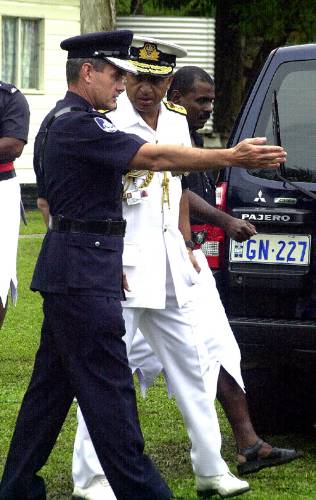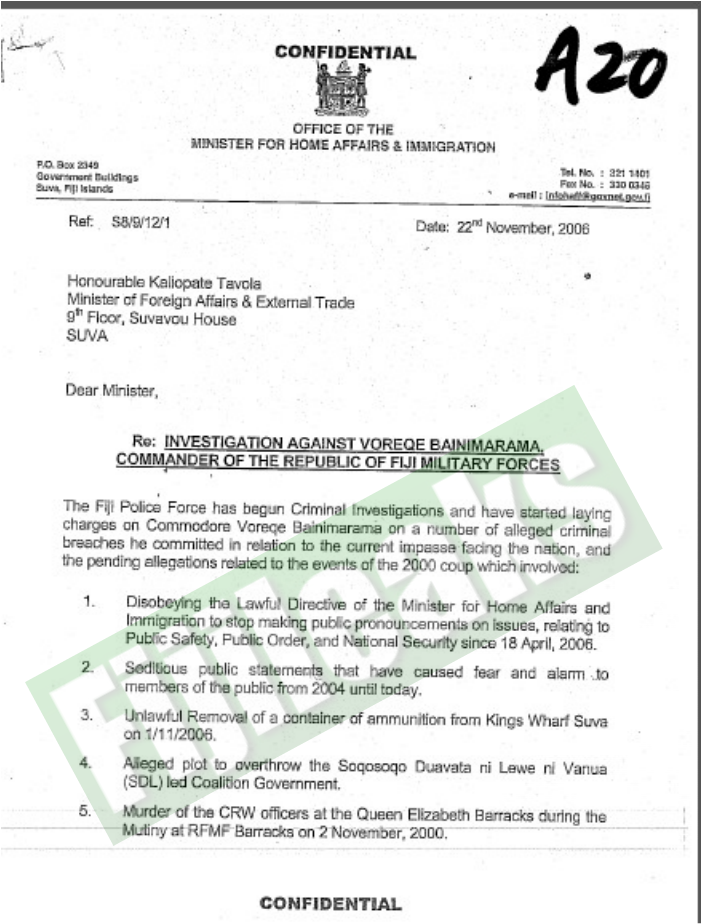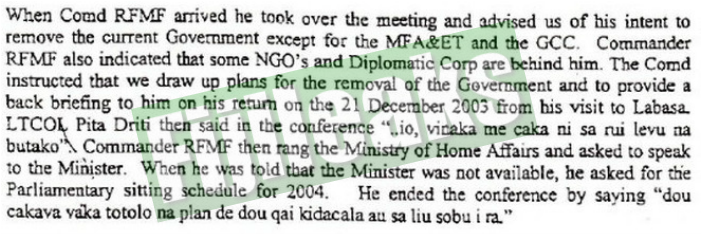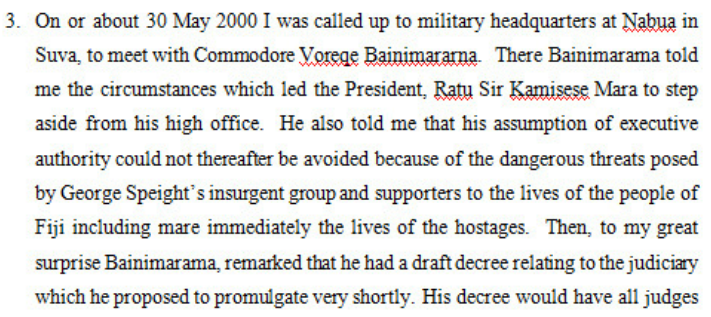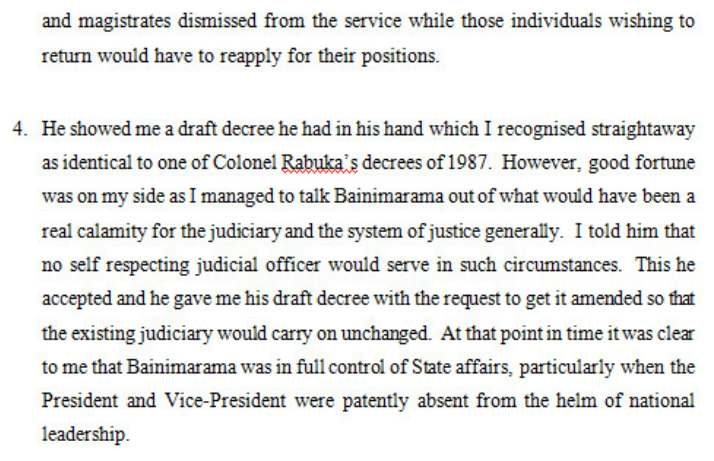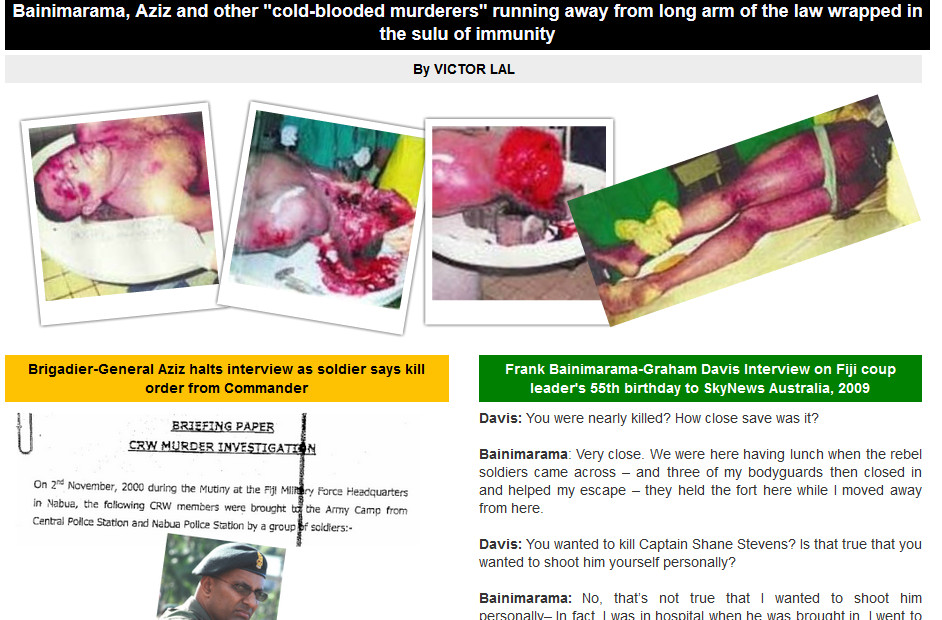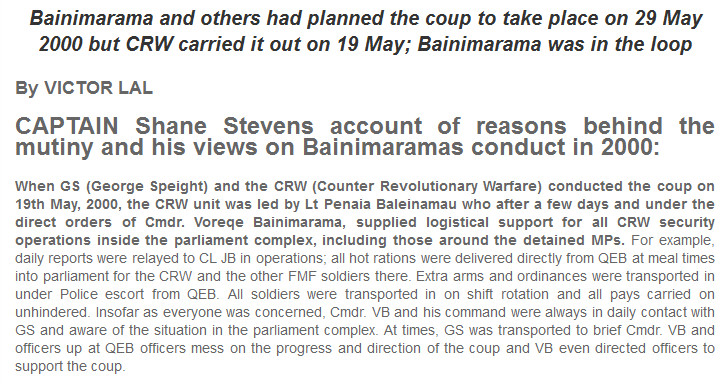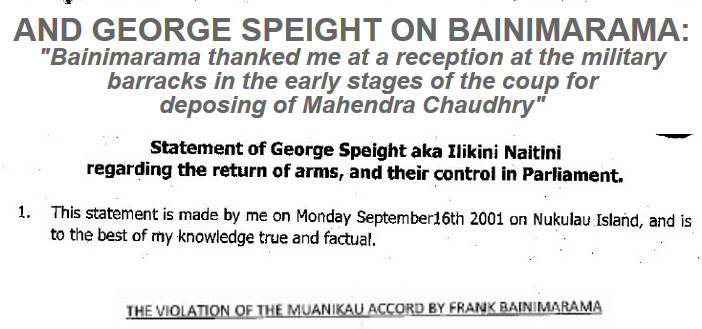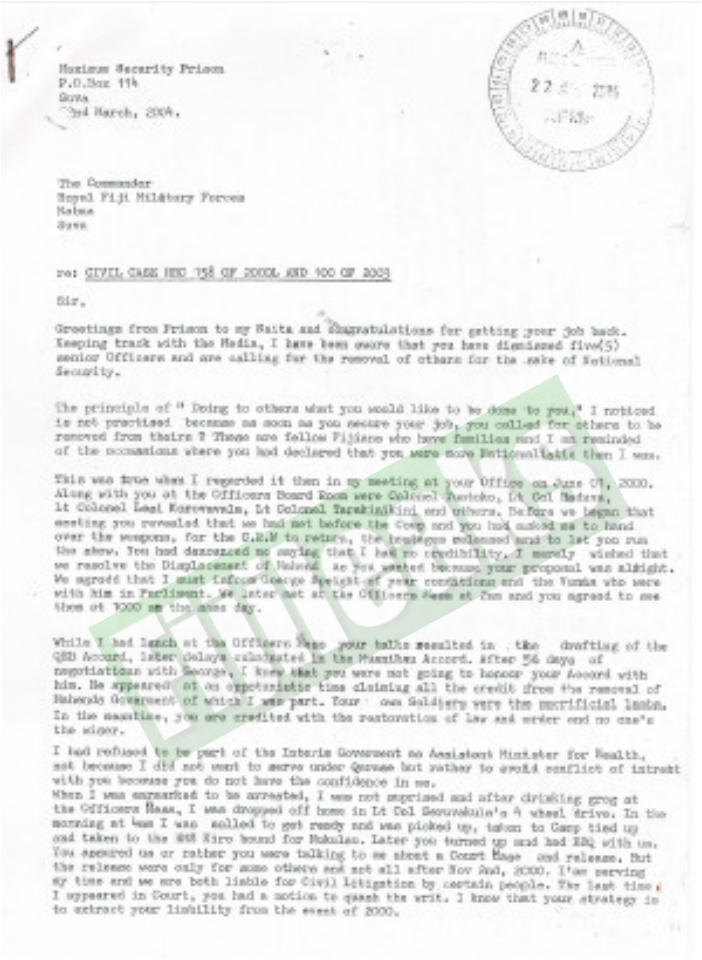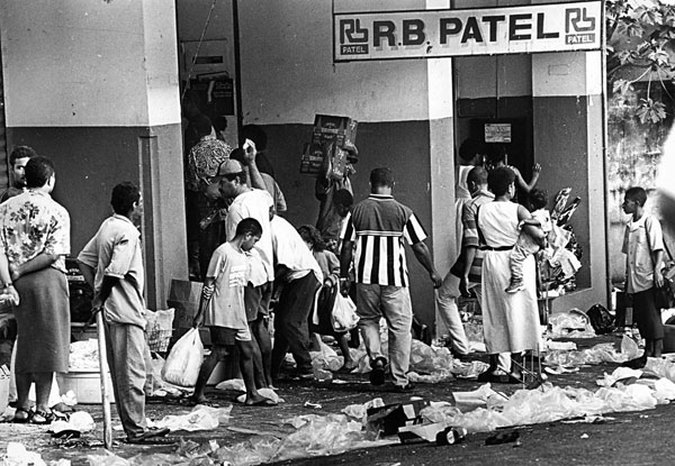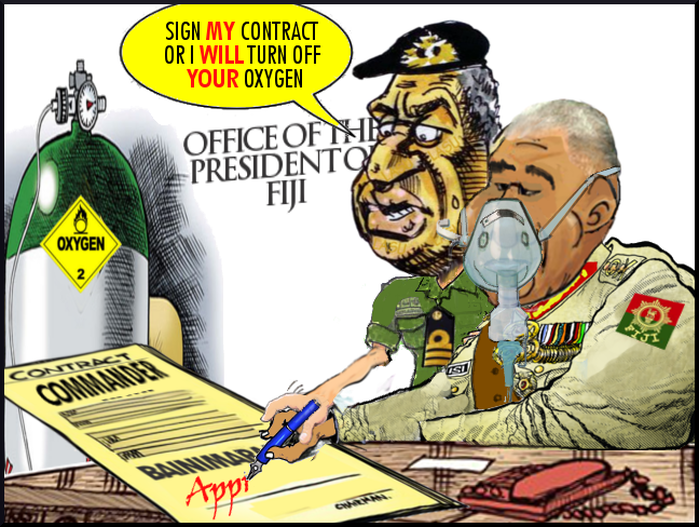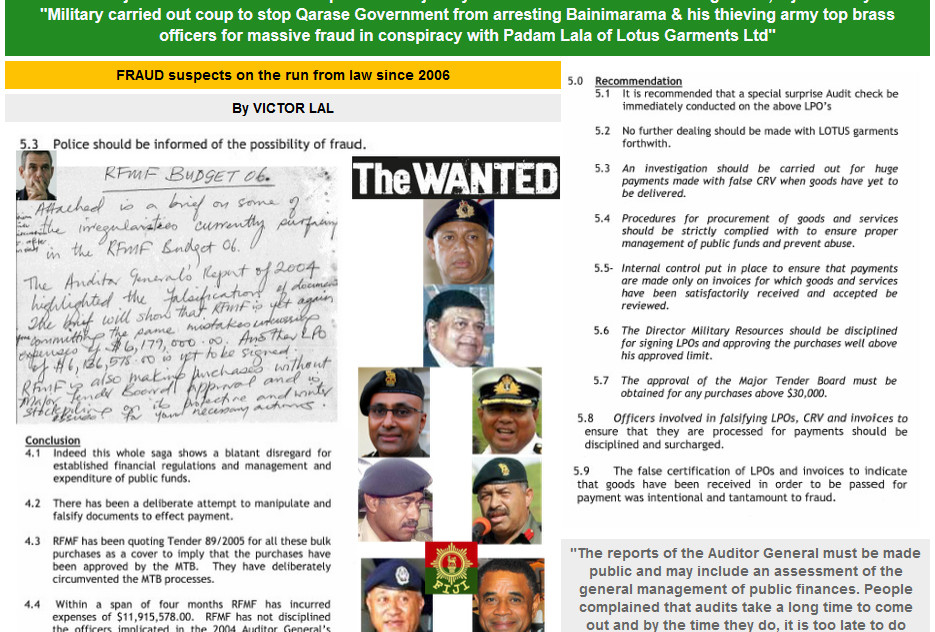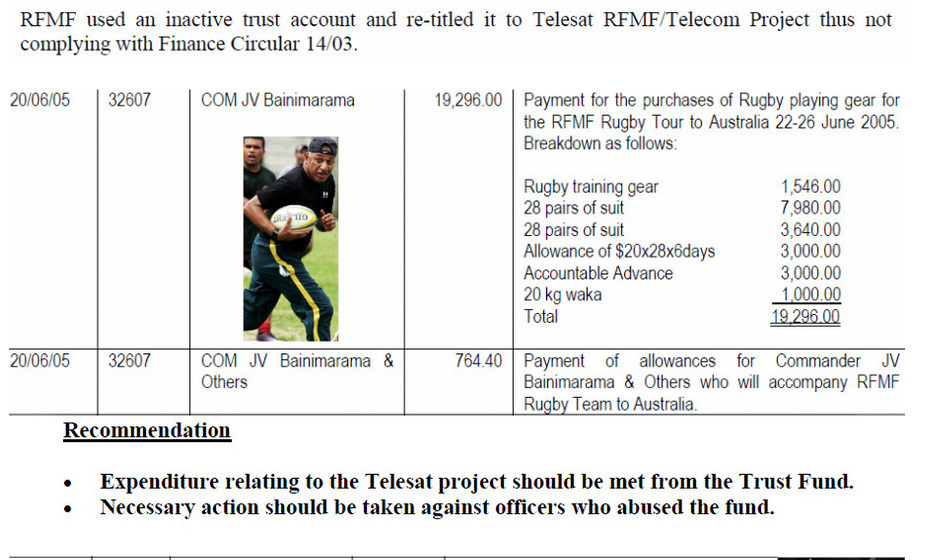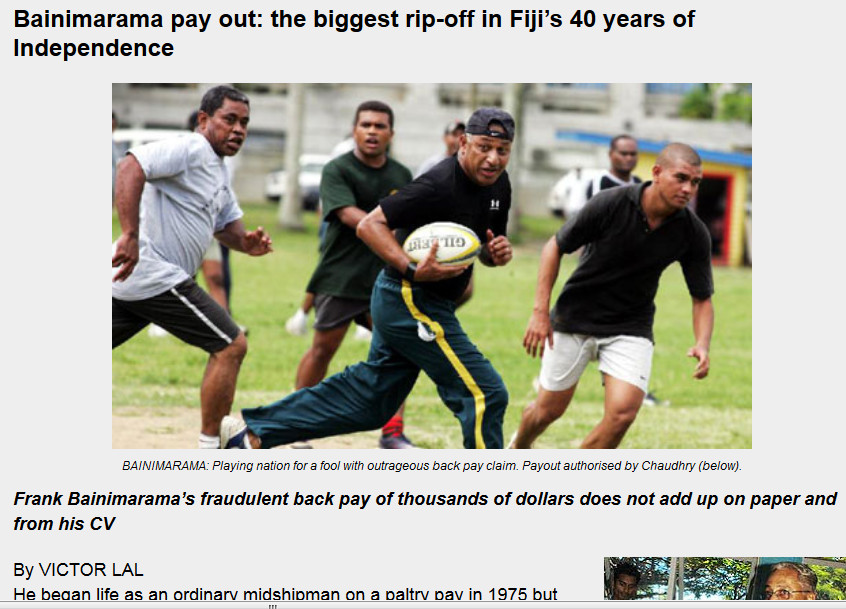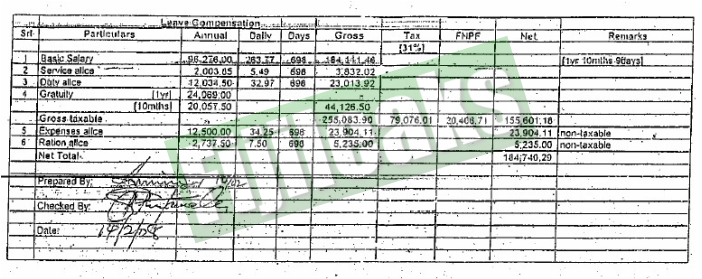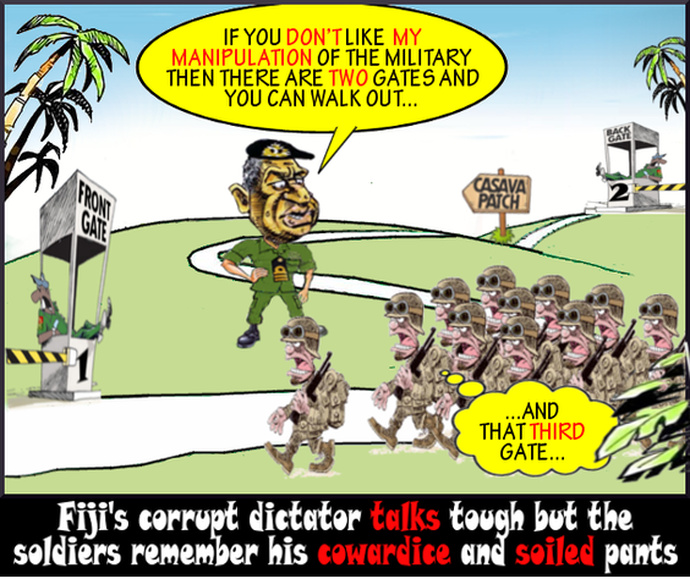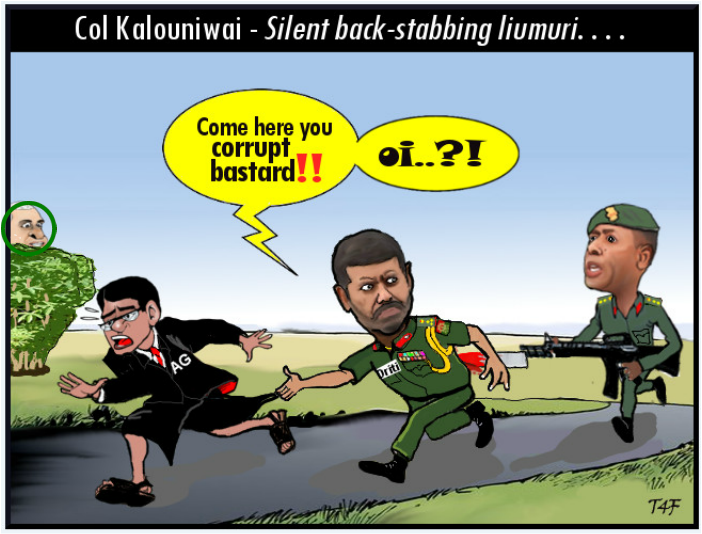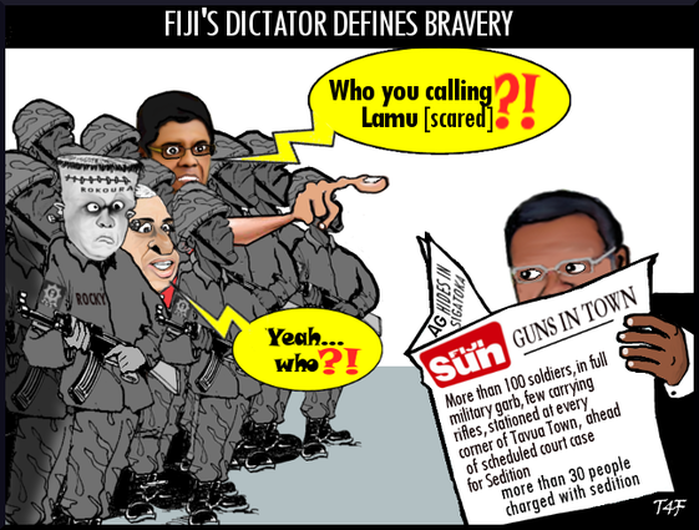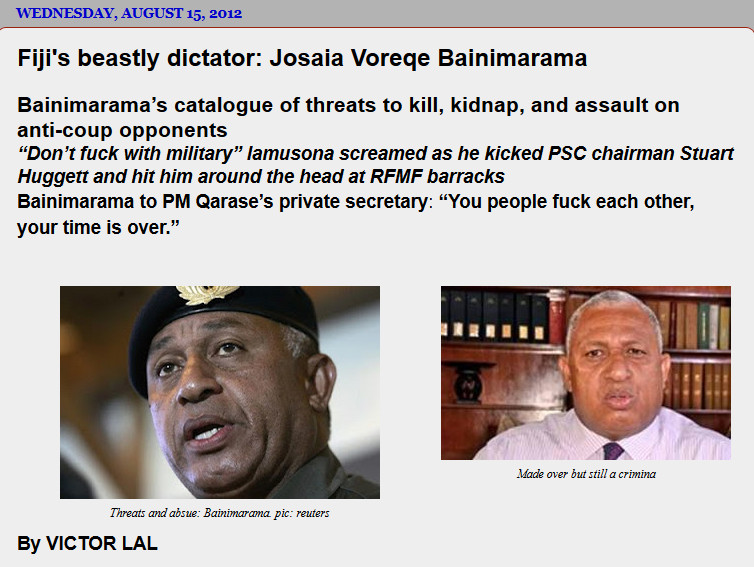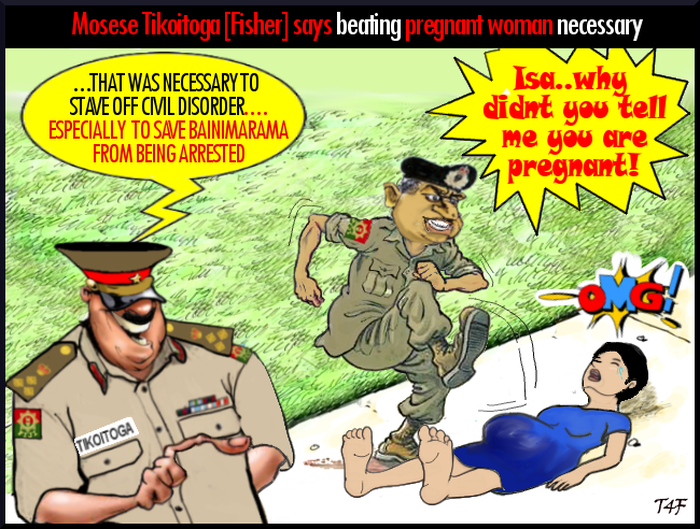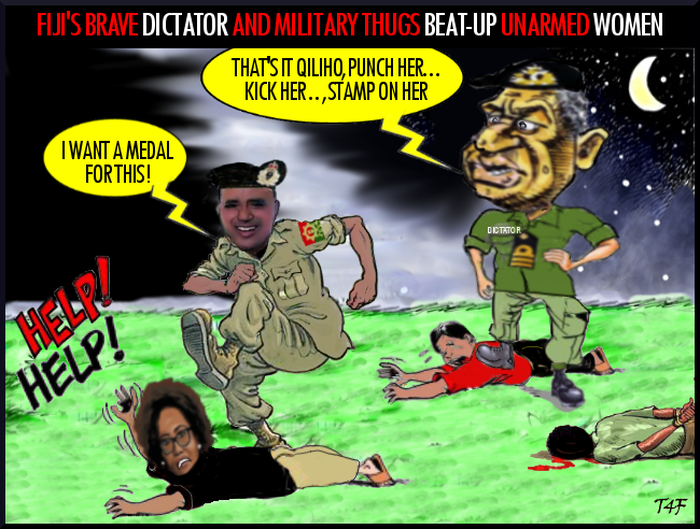[1/8/2015]
SODELPA President Ratu Naiqama Lalabalavu and Opposition Leader Ro Teimumu Kepa today issued a joint statement in response to allegations against the party made by Prime Minister Bainimarama at the commissioning of the Government vessel MV Cagivou.
The SODELPA leaders said the Prime Minister’s utterances are prime examples of the hypocrisy of his leadership and government. The Leaders said his threats are becoming more pronounced and aggressive and have a similar tone to those he made during the lead up to the 2006 coup he launched against a democratically elected government.
According to Ratu Naiqama and Ro Teimumu the difference this time is that Government strategy is orchestrated by QORVIS, the US based PR Company that is paid $1 million a year from taxpayer’s funds. The Fiji Sun is also a key strategic player in the Government’s plans, along with other organizations. The Fiji First government is using them to portray Mr. Bainimarama’s military take-over not as a coup but as some sort of reformist initiative. That approach is a fraud on the nation.
Ratu Naiqama and Ro Teimumu remind the government that a coup is a coup and treason is treason.
The SODELPA leaders said the level of the Prime Minister’s hypocrisy is so excessive, it is important to respond to each of his misrepresentations.
PM: Sedition: He is reported to have said quote ‘if you encourage sedition, you are committing an offence’ unquote.
SODELPA: In 2006 Frank Bainimarama was himself on the verge of being arrested and charged with sedition. To escape the consequences of this he committed treason and carried out his coup. Now he warns the citizens of Fiji not to break the law, but refuses to answer for his own lawless behaviour.
PM: Violence: He is reported to have said quote ‘if you urge violence against anyone in Fiji, you commit a serious offence’
SODELPA: Under Frank Bainimarama’s leadership following the 2000 and 2006 coups there have been deaths and brutal murders of civilians and soldiers as well as human rights violations against innocent citizens. He is warning against anyone urging violence. But he led a regime that survived on violence, threats and repression. He has many questions to answer himself about specific acts of violence and torment. He has attempted to protect himself from fronting up to courts of law to answer for his role.
PM: The Law: He is reported to have said quote ‘the hand of the law is very long and rest assured the authorities in Fiji will not rest until you are bought to justice’ unquote
SODELPA: Ratu Naiqama and Ro Teimumu agree totally with Prime Minister Bainimarama. The arm of the law is indeed very long. This is what keeps him awake at night. While he is threatening other citizens with being brought to justice, he hides behind immunity provisions in Chapter 10 page 147 of the constitution. The SODELPA leaders accuse Prime Minister Bainimarama of lacking integrity and the moral courage to do as he expects all others to do. When it comes to ‘equality under the law’, he exempts himself.
But Ratu Naiqama and Ro Teimumu reiterate that the arm of the law is very long. “We want to assure everyone that in this globalised day and age, it will also reach the Prime Minister and all his treasonous accomplices. They will have to face up to the serious wrongs they have committed.”
PM: Dividing Fiji: The Prime Minister urges people not to be fooled by those trying to divide Fiji and asks citizens to report any illegal activity to the Police. He says if people know anyone who is involved, they should tell them they risk spending many years in jail.
SODELPA: This kind of fear mongering and urging family and friends to spy and report on each other is typical of the tactics of Adolf Hitler and his Gestapo and Josef Stalin and his KGB in imposing control on their people. This thinking by the Prime Minister is a confirmation of his desire to deny people their rights to personal liberty, freedom from degrading treatment, freedom of speech, expression and publication as outlined in the Bill of Rights in his 2013 constitution. By implementing such a policy he would be dividing the people to serve his own ends.
PM: Enemies: He is reported to have said quote ‘ They want to impose their will on everyone else, they are enemies of the state, and enemies of the Fijian people, enemies of Investment, enemies of modern Fiji, they are enemies of prosperity for all, and we are going to track them down and bring them to justice’ unquote
SODELPA: The prime imposition on our people is what was done in 2006 by Prime Minister Bainimarama. It continues to the present. The real enemies of the state are those who broke their sworn oaths to defend us, and instead turned their weapons on us. The real enemies of investment are the officials who indulge in favouritism, nepotism and corruption to support favoured investors over others; the real enemies of modern Fiji are officials who are aware of the wrongs and injustices being done to the people and the country but remain silent out of fear; the real enemies of our prosperity are the Prime Minister and Finance Minister who, in their arrogance, think it is acceptable to spend $100 million of taxpayers money without proper records and documentation. They apparently believe this is as transparent and accountable as they need be.
PM: Attack on Democracy: He is reported to have said quote ‘Attacks on democracy will not be tolerated, the lives of Fijians could only be improved via working together as a nation and one Fiji. Unquote
SODELPA: It is fitting that our final response is in relation to his claims of attacks on our democracy. He admits that the lives and future well-being of all our people can only be improved via working together. This is the policy approach SODELPA has repeatedly put to the Fiji First government since the opening of parliament in October 2014. The Prime Minister himself has repeatedly rejected overtures from SODELPA and the National Federation Party for an inclusive collaborative approach. The recent offer by Ratu Naiqama of an olive branch to find a solution to the current issues in Ra, Ba and Nadroga is another example in that he says he wants to do this, but is incapable of it.
His preference as is to continue to operate as he has done since 2006. He sees Parliament as a continuation of his dictatorship while it provides a façade of democracy that does not exist.
PM: Elected Government by the people: He is reported to have said quote ‘the said Government was chosen by the Fijian people in the elections last year and this made it the only lawful government, and to challenge it is to defy the will of the Fijian people. It is an attack on democracy and it will not be tolerated’ unquote
SODELPA: This is the ‘mother of all hypocritical remarks’ made by the Prime Minister. It demonstrates the level of dysfunctionality in his thinking and the unreality of the world he occupies. In 2006 the people elected the SDL government, so it was the lawfully elected government of the people. And yet he attacked it illegally with military force. But he is afraid to subject himself to the law for his actions.
Our decision to contest the 2014 general elections under the imposed 2013 constitution was never an endorsement of it and we expressed these views in a signed letter to the President after we were sworn in. We decided that contesting the elections was an important first step away from military dictatorship which had prevailed for eight years, and that would help us begin our return to accountable and transparent governance.
There is still a long way to go. Democratic freedom does not come easily. Many of us have paid and are still paying a very high price for the journey we have embarked on. There will be many more hurdles to overcome before we can achieve true democracy. We in SODELPA are committed to achieving this.
For now, we call on all law-abiding citizens, not to be moved from doing what is right and just. Speak out as loudly as you can about all of the wrongs this government and QORVIS are sweeping under the carpet.
We do not condone or support any acts of violence against anyone. We support everyone’s right to life and right to personal liberty as well as freedom from cruel and degrading treatment. We stand for all the other rights that protect our citizens. We call on the Prime Minister to stop making his outrageous allegations and let the Police do the job they are constitutionally obliged to do. He should instead concentrate on fixing our failing economy and sugar industry.
Authorized By
Ratu Naiqama Lalabalavu
President
Ro Teimumu Kepa
Leader of the Opposition
By Victor Lal and Russell Hunter
Dictator Frank Bainimarama narrowly escaped New Zealand charges days before the 2006 coup. There were already sedition charges against him in Fiji, where the police were also keen to talk to him regarding the murders of the CRW soldiers that followed the 2000 mutiny. He was aware of all of this.
Now he is calling Lt Colonel Ulilakeba Mara a “fugitive” from law and seeking extradition from Tonga.
Betrayal and cowardice are two traits that are deeply ingrained in the veins of dictator Frank Bainimarama, the self-anointed illegal Prime Minister of Fiji.
Our claims are based on five years of painstaking research, personal interviews, top secret State, military and other confidential documents. For a detailed account of our findings, please wait for our forthcoming book tentatively entitled Treason in Paradise: Commodore Frank Bainimarama and the 2006 Fiji Coup – The Inside Story.
We will shortly disclose how Bainimarama left New Zealand in November 2006 where the local police had reversed an earlier decision to arrest him on a charge of perverting the course of justice in a foreign jurisdiction. If convicted he faced a maximum sentence of seven years. Perverting the course of justice in a foreign jurisdiction is a crime in New Zealand.
Remember there was also a pending charge of sedition in Fiji. Plus the police were closing in the Counter Revolutionary Warfare Unit murder inquiry.
The Fiji police wanted to establish whether or not Bainimarama was an accessory to the crimes. But Bainimarama had avoided at least two invitations for a non-caution police interview but couldn’t maintain that indefinitely. And he knew that.
It was one of many motives which prompted him a week after his departure from New Zealand, where he had gone for his grand daughter’s christening, to overthrow the democratically elected multi-party SDL-FLP government in December 2006.
But, first, let us examine the “Fugitive” Bainimarama’s pattern of betrayal and cowardice.
The 2000 Speight Coup
Despite conventional but uncontested narrative, we can disclose that Bainimarama was behind the 2000 George Speight putsch that resulted in the overthrow of the Chaudhry government and the subsequent hostage crisis that lasted for the next 56 days.
And the mutiny that followed in November 2000 was a result of his betrayal of Speight and others after the signing of the Muanikau Accord. Bainimarama not only deceived the then President Ratu Sir Kamisese Mara, the father of Ratu Ului, to step aside at the height of the crisis, but he also betrayed the “Speight Gang” in order to ensure that the way was now open for him to enter the corridors of political power in Fiji.
Bainimarama, according to confidential documents and statements in our possession, had suggested military rule for at least five years shortly after the release of Speight’s hostages. Certainly some of his senior officers at the time were aware that he thoroughly relished his taste of power, when he took over as president in 2000 before handing over to an interim civilian regime, led by Laisenia Qarase. But Bainimarama longed to taste it again.
We are well aware of the much publicised “cassava patch” dash that Bainimarama made as the bullets were flying all over the Nabua barracks.
What he has refused to disclose is that he began suffering post trauma stress syndrome. In the aftermath of the mutiny Bainimarama had brushed aside all offers and suggestions of counselling thinking it perhaps unsoldierly.
The full results of that can only be guessed at, by psychologically unqualified writers, but results there certainly were.
We may recall that three loyalist soldiers died during the 2000 mutiny. The 20 or so wounded would all recover. The scar of that day, however, has never healed.
The potential for violent retribution was obvious – but few in Fiji expected what followed from a once proud disciplined service.
Five members of the Counter Revolutionary Warfare unit were quite literally kicked to death the following day, November 3. Post mortem photographs in our possession display viciously mutilated corpses barely recognisable as human remains. At least one of the dead played no part in the mutiny. It seemed CRW membership alone was sufficient motive for the most brutal of murders.
Acting Police Commissioner Moses Driver pronounced the deaths as murder and launched an investigation – a deed that marked him for later attention by the military. Bainimarama remains the principal person of interest in the murder inquiry. To date, no one has been charged over those murders.
The shootings and killings were over – but the stain of the 2000 mutiny would never be removed. And Bainimarama could never feel safe again – from those whom he betrayed and the long arm of the law.
He became a deeply paranoid individual who concluded that his career advancement depended on the barrel of the gun and pliable military men around him.
It was February 2007 - two months after Commodore Frank Bainimarama seized power in Fiji - when Time magazine's Australian editor Steve Waterson arrived in Suva to assess the situation.
The coup leader, aware that his image abroad needed serious repair, immediately granted an interview and launched a charm offensive.
"Just call me Frank," he told Waterson, and later added, "I didn't want this job." He explained he was needed to clean up corruption and put the nation on a path to prosperity.
A series of documents smuggled out of Fiji tell a vastly different story. Bainimarama not only wanted the job but had tried three times previously to seize control of the nation.
His first attempt occurred during the negotiations to end the George Speight hostage crisis in August 2000. Several of those present confirmed that the Commodore - who had tacitly supported the Speight coup - declared that the military should lead the nation "for the next five, 10 or 50 years".
A heated argument between Speight and Bainimarama ensued, ending only when President Ratu Josefa Iloilo said a democratic solution was the only way forward.
Bainimarama proposed that banker and businessman Laisenia Qarase should lead an interim government with elections after one year. But to his frustration he found his "advice" to the interim government was routinely shunned.
By December 2003 the Qarase government - tired of the Commodore's constant and often public interference - was reluctant to renew his term, due to expire in April the following year.
When Bainimarama got wind of this, he flew into a rage and ordered his senior officers to start planning a coup. But he reckoned without senior officers who counselled against such action and finally refused to implement his orders.
On January 5, 2004, secret advice to Bainimarama not to stage a coup warned of the chaos and damage that could follow.
The document, composed and signed by Lieutenant Colonel Jeremaia Waqanisau, Colonel Alfred Tuatoko, Colonel George Kadavulevu, Colonel Samuela Raduva and naval commander Timoci Koroi, reads in part:
"We feel that the interests of the RFMF (Republic of Fiji Military Forces) and the nation have been overridden by your personal wishes ...
"Under the circumstances there is no way you can justify your intent and impending action. On the other hand the consequences of such action would be catastrophic for Fiji. The despair and suffering will be unbearable and longer lasting than that experienced after 1987 and 2000."
None of the officers agreed to be interviewed.
However, the later "redress of wrong petition" also contains a statement by Tuatoko, who wrote: "In my interview with [Bainimarama] he stated that he would forcefully remove the present government if his term as Comd RFMF was not renewed.
"I advised him that such an act was illegal and amounted to treason. I advised him that there are legal ways to settle his disagreement with government and that he must follow that legal path. Comd said that doing so would take too much time. He said that removing the government would be legally wrong but was morally correct."
This document was sent to the Minister for Home Affairs, Joketani Cokanasiga, and is likely to have been seen by Qarase. Incredibly, nothing was done. A senior minister told Hunter at the time: "We're not too worried about him [Bainimarama]. He doesn't have the support at the camp that he thinks he has."
The aborted coup of January 2004 persuaded the Government that the soldiers would not obey their commander if he ordered them to commit treason by removing it.
In December 2005, Bainimarama decided to try for a third time. He had been reappointed, so his job was no longer an issue, but he knew Police Commissioner Andrew Hughes had no intention of backing off a murder inquiry into the deaths of five members of the elite Counter Revolutionary Warfare unit, kicked to death by loyalist soldiers after the November 2000 mutiny.
There was also anger in sections of the officer corps (by now mostly hand-picked Bainimarama men) that the Qarase Government was "soft" on those involved in the 2000 coup.
Bainimarama had sacked the five officers who refused to carry out his first attempted coup and appointed Lieutenant Colonel Jone Baledrokadroka as Land Force Commander - effectively his deputy. He told Baledrokadroka to prepare plans for a military takeover.
Like his brother officers before him, JB (as he was known) refused to be involved in treason. He was told to take leave and not come back but again the coup had to be postponed.
JB told Hunter on the day of his dismissal: "I saw an order that I deciphered as treasonous and I could not accept it."
By May 2006, in the full realisation that Bainimarama's reappointment had not bought off its troublesome military commander and with a fresh election victory under its belt, the Cabinet wanted him gone.
There was talk of surcharging him for the blatant abuse of military funding in the army's "Truth and Justice" campaign that sought to influence voters during the 2006 election. It came to nothing - but Bainimarama was to hear of it and it fanned the flames of his fury.
With the dismissal of JB he was able to surround himself with an officer corps that owed their positions to him alone. His coup would take place within a year.
Claim strongman threatened to kill officer
Fiji leader Frank Bainimarama threatened to kill a former top army officer who challenged his 2003 coup plan, according to the officer's written testimony.
The late Lieutenant-Colonel Jeremaia Waqanisau refused to carry out the Commodore's coup order and took a new job as CEO at the Ministry of Home Affairs.
In a file note at the time he recalled in January 2004 the Commodore barged into Home Affairs Minister Joketani Cokanasiga's office with several bodyguards, accusing Waqanisau of raising an army against him.
"Bainimarama further said had it not been for the minister I would have been dead already, and next time the military came back to finish what they started he would personally lead [them] to town and make sure I would be the first to die.
"I told Bainimarama when he came down next time he should come alone, without his weapon and his armed body guards and then try to kill me. He became furious challenging me to a fight taking off his [weapon] and posing for a fight... I said I didn't want to fight him and he should go away. The minister was holding him back and eventually pushed him out the door."

